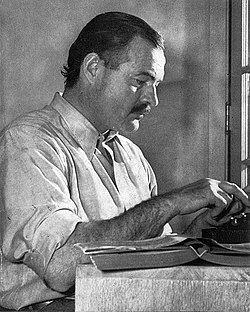Ernest Hemingway Quote
I’ve seen you, beauty, and you belong to me now, whoever you are waiting for and if I never see you again, I thought. You belong to me and all Paris belongs to me and I belong to this notebook and this pencil. Then I went back to writing and I entered far into the story and was lost in it. I was writing it now and it was not writing itself and I did not look up nor know anything about the time nor think where I was nor order any more rum St. James. I was tired of rum St. James without thinking about it. Then the story was finished and I was very tired. I read the last paragraph and then I looked up and looked for the girl and she had gone. I hope she’s gone with a good man, I thought. But I felt sad.
I’ve seen you, beauty, and you belong to me now, whoever you are waiting for and if I never see you again, I thought. You belong to me and all Paris belongs to me and I belong to this notebook and this pencil. Then I went back to writing and I entered far into the story and was lost in it. I was writing it now and it was not writing itself and I did not look up nor know anything about the time nor think where I was nor order any more rum St. James. I was tired of rum St. James without thinking about it. Then the story was finished and I was very tired. I read the last paragraph and then I looked up and looked for the girl and she had gone. I hope she’s gone with a good man, I thought. But I felt sad.
Related Quotes
About Ernest Hemingway
Hemingway was raised in Oak Park, Illinois, a suburb of Chicago. After high school, he spent six months as a reporter for The Kansas City Star before enlisting in the Red Cross. He served as an ambulance driver on the Italian Front in World War I and was seriously wounded by shrapnel in 1918. In 1921, Hemingway moved to Paris, where he worked as a foreign correspondent for the Toronto Star and was influenced by the modernist writers and artists of the "Lost Generation" expatriate community. His debut novel, The Sun Also Rises, was published in 1926. In 1928, Hemingway returned to the U.S., where he settled in Key West, Florida. His experiences during the war supplied material for his 1929 novel A Farewell to Arms.
In 1937, Hemingway went to Spain to cover the Spanish Civil War, which formed the basis for his 1940 novel For Whom the Bell Tolls, written in Havana, Cuba. During World War II, Hemingway was present with Allied troops as a journalist at the Normandy landings and the liberation of Paris. In 1952, his novel The Old Man and the Sea was published to considerable acclaim, and won the Pulitzer Prize for Fiction. On a 1954 trip to Africa, Hemingway was seriously injured in two successive plane crashes, leaving him in pain and ill health for much of the rest of his life. He committed suicide at his house in Ketchum, Idaho, in 1961.
